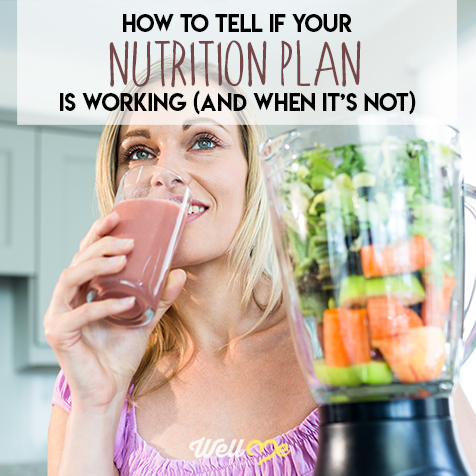It’s exciting to get started on a new nutrition plan. You’ve done a bunch of research, you have your meal plans all set up, and you’ve taken some sweet shopping trips to the grocery store. Finally, it’s time to start your nutrition plan but what if all this effort is for naught? What if this lifestyle change does you more harm than good?
Believe us, it’s completely normal to feel a little concerned. The good news is that it’s easy to tell whether your nutrition plan is working or not. It doesn’t even take that long to start to notice — after just a couple of weeks your body should be experiencing the benefits of your nutrition plan. It shouldn’t be just about losing weight, since how you feel is the most important thing.
Use the following signs to actively listen to what your body is telling you about your nutrition plan.
Energy vs. Exhaustion
 People who are supplying their bodies with the right nutrition are going to have high levels of energy, plain and simple. This doesn’t take the same form as a kind of “fake” energy like what you get from hits of caffeine. Rather, it means your energy has no end. You will wake up just because your body is ready to wake up instead of forcing yourself out of bed after hearing your alarm.
People who are supplying their bodies with the right nutrition are going to have high levels of energy, plain and simple. This doesn’t take the same form as a kind of “fake” energy like what you get from hits of caffeine. Rather, it means your energy has no end. You will wake up just because your body is ready to wake up instead of forcing yourself out of bed after hearing your alarm.
You won’t even need caffeine at all because you have enough energy already. You won’t have that late afternoon crash that encourages many people to eat a bunch of sugar at 3:30 or 4:00 in the afternoon. Your workouts will even feel better, since they won’t take as much out of you as they once did, and you’ll be able to function normally after a good workout.
That’s how you know your diet or nutrition plan is working successfully. But what if it’s not actually working? What if you are leaving out crucial nutrients without even realizing it? When you change up your nutrition plan it can be rather tricky, since you never know if you have inadvertently removed something you really need.
Fun Fact: One of the best ways to tell your nutrition plan is working is at 3pm in the afternoon, when your coworkers are becoming sleepy and unproductive. If you’re one of the few still alert, your nutrition plan is working.
Luckily, there is one simple way to notice if you are indeed missing a crucial ingredient in your diet: you’ll feel tired or exhausted all the time for no explainable reason. This is especially important to pay attention to if you are fulfilling all the other requirements in order to prevent exhaustion. In other words, are you sleeping enough (a bare minimum of 7 hours per night on a consistent basis)? Have you been exercising? Are you addicted to caffeine?
If you’re getting enough sleep, exercising at least moderately, and don’t have a major caffeine addiction, there is no reason you should feel exhausted all the time. The remaining cause of this exhaustion must then be your new nutrition plan. Everyone feels tired after a night of poor sleep or when they are experiencing new circumstances (such as a new job or changing your routine in some other way). But it is not normal to wake up feeling exhausted morning after morning or to barely be able to make it to 3 or 4 o’clock in the afternoon without caffeine, sugar, or napping on a daily basis.
If you are someone who is exhausted on a daily basis, you most likely need to change what you’re eating. If you have changed your nutrition plan within the last month, there is a good chance this is to blame — and that means it’s time to examine what exactly you’re missing from your diet. Oftentimes a B12 deficiency or Vitamin D deficiency is to blame for feeling tired all the time. This can easily happen to people who have changed to a plant-based diet without adding B12 supplements into their routine, for example.
In summary, if you’ve got tons of energy, your nutrition plan is working. If you’re constantly tired, it’s not. Never forget that food is fuel, after all!
Mental Health
Poor mental health is a tricky subject because it can be caused by all sorts of things – it could be genetically inherited or due to past trauma. Nonetheless, having a healthy diet can actually make you happier, whatever your mental health state is.
Without generalizing too much, your mental health has a lot to do with the food and nutrients you’re taking in.[1] This is especially the case if you are someone who undergoes various states of brain function throughout the day. If your brain is extremely awake right after you’ve had sugar or a coffee, for example, but then fogs over in the late afternoon and maybe even makes you feel unhappy around the same time, then there’s a good chance that a better diet is going to make you feel more stable and consistently happier.
Part of this has to do with the fact that if you feel physically better, you’re just going to emotionally feel better about your body. For people with self-image issues, this is a huge plus. It’s not about actually losing weight or looking much different, but simply having better body function (energy, strength, vitality, and so on). Even people with skin issues could witness it clearing up from proper nutrition, which might give you reason to feel even more confident.
People who eat properly are simply more mentally stable. The key thing to remember here is that it means that it is an improvement within your personal spectrum. While good nutrition won’t cure depression, it certainly could lead to having more good days than bad ones.
Although weight loss shouldn’t be your only goal when starting a nutrition plan, body positivity certainly will come along with a nutrition plan that is working well. Your body knows when it’s doing well (in terms of health, strength, well-being, and function), and your brain is going to realize it, too. When your body does well, your mind does well, and that means you will even feel better about your body too.
Digestion
 People who have poor diets are more likely to suffer from problems with their bowel movements. This includes symptoms such as Irritable Bowel Syndrome or constipation. Most likely the foods are to blame if you are experiencing some kind of negativity in your digestion and bowel movements. People who have trouble with digestion probably need more fiber or fat, so be sure to examine the nutrients you currently have in your nutrition plan to see where you could add those in.
People who have poor diets are more likely to suffer from problems with their bowel movements. This includes symptoms such as Irritable Bowel Syndrome or constipation. Most likely the foods are to blame if you are experiencing some kind of negativity in your digestion and bowel movements. People who have trouble with digestion probably need more fiber or fat, so be sure to examine the nutrients you currently have in your nutrition plan to see where you could add those in.
Speaking of digestion, your reactions to food should be minor — if not nonexistent — when you are using the best nutrition plan for you. People with food allergies or food sensitivities are going to be suffering if they eat those foods anyway. If you have designed the proper nutrition plan for you, then you’re going to only have a positive physical response after your meals rather than stomachaches, bloating, indigestion, and so on.
A person with a healthy nutrition plan is going to have regular and comfortable bowel movements, not have adverse stomach reactions right after eating a meal and will generally have uninhibited digestion. If you haven’t thought about your digestion in a while, there’s a pretty good chance that everything’s going okay. Better yet, if you’ve noticed an improvement in your digestion, then your new nutrition plan is clearly working wonders. Keep it up!
Immune System Function
Everybody gets sick, but not everyone gets sick all the time, such as on a monthly basis. If you are feeling as though you haven’t even gotten over your last illness and you’re already getting a new one, it could just be the start of a rough cold season — or it could mean that your immune system isn’t functioning at its best.
A healthy immune system is a primary sign of a healthy lifestyle (including a healthy nutrition plan). People who eat healthy may be sick a couple times a year, for example, but they won’t be getting illness after illness, week after week. If you are someone who has felt like you constantly have headaches, sore throats, congestion, and a general feeling of weakness, your food choices could be to blame.
Sometimes immune system health and function is tied to what you’re eating rather than just what you are not eating. There are certain foods that tend to do more harm than good when you consume them, especially where the immune system is concerned. These foods or ingredients include sugar, processed foods, alcohol, and substances that are inflammatory. If these foods exist in your diet and you’ve been sick a lot, you better cut them all out and start drinking more water to help give your body and immune system the break it so needs.[2]
On the other hand, if you used to get sick quite often and are slowly starting to realize that you are not coming down with colds as often nowadays, there is a good chance your nutrition plan is working well. This is especially likely if this change in immune system effectiveness coincides with your diet choices of cutting out sugars, processed foods, alcohol, etc. Remember, food is fuel, and if you stop eating things that are toxic for your health then your entire body is going to function better. So, if you’re no longer sick as often as you used to be, keep doing what you’re doing with your nutrition plan!
Fun Fact: There are tons of nutrition fads that come and go, but they’re not all good for you. Good nutrition shouldn’t change, however; the basics (eating lots of vegetables, getting healthy fats, cutting down on processed foods and added sugars) should stay the same. Don’t trust the latest fad!
Food Cravings
Your body is pretty good at what it does, whether it is dealing with illnesses, telling you that you’re hungry or thirsty, or becoming tired when you need sleep. It has found a way of conveying messages to your brain so that you take the necessary action to keep it healthy. One of those messages is a food craving.
 A food craving is different from being bored and feeling like snacking, although sometimes it’s hard to tell the difference. If you’re having major cravings that center around one type of food, however, it’s probably something that should be paid attention to. For example, if you find yourself intensely craving salty foods, there’s a chance it could be caused by consuming too little minerals.[3] If you’re craving sweets (again, an intense craving is different from seeing a candy bar at the checkout and suddenly deciding you feel like some sugar), there’s a chance you could have a protein deficiency (or potentially another kind of mineral or vitamin deficiency).
A food craving is different from being bored and feeling like snacking, although sometimes it’s hard to tell the difference. If you’re having major cravings that center around one type of food, however, it’s probably something that should be paid attention to. For example, if you find yourself intensely craving salty foods, there’s a chance it could be caused by consuming too little minerals.[3] If you’re craving sweets (again, an intense craving is different from seeing a candy bar at the checkout and suddenly deciding you feel like some sugar), there’s a chance you could have a protein deficiency (or potentially another kind of mineral or vitamin deficiency).
Although it’s easy to forget in the relatively safe 21st century life, our bodies are designed for one thing: survival. They know when they need something, and they have evolved to find ways to get you to do the things it needs. Trust it.
Of course, there’s another aspect that isn’t being considered here: overeating. This can stem from a variety of reasons, many of which are psychological rather than physiological.[4] In psychological cases (such as emotional overeating), this compulsion doesn’t have to do with the question of whether you are fueling your body with the right nutrients. Nonetheless, having a balanced nutrition plan is going to give you the best chance for consuming healthy amounts of food.
If you’re not experiencing any specific food cravings on a regular basis, your nutrition plan is likely doing its job in getting you all the nutrients you need.
Summary: What Should You Do Now?
To sum up, the most important way to find out if your diet or nutrition plan is working is to simply listen to your body. If your body is giving you intense cravings, is exhausted constantly, keeps getting sick, is having issues with digestion, and so on, then you probably should assess your nutrition plan to see where you went wrong.
If, on the other hand, you feel fresh when you wake up and have the energy to last throughout the day, your digestion is normal, your food cravings aren’t too strong, and you’re overall healthier in general, your nutrition plan is definitely going right. Remember that the way you feel is so much more important than how much weight you’ve lost or gained (if that is the goal).
If you’re looking for ways to figure out more concretely if your plan is a good one, look no further! Check out the following action steps.

Action Steps: Tips for Tracking Your Progress
- Write down what you’ve noticed. If you’re starting to notice a gain in daily energy levels, or that you’re having fewer meltdowns, start writing that down. Sometimes it’s hard to just “tell” if you’ve been more energetic, but if you write down each day you felt you were at a certain energy level, you might start to see the patterns over time.
- Track your habits. If you’re making a change that you know is a healthy one, such as eating one more helping of vegetables every day, start keeping track whenever you do that. This will help give you a better overall picture of how your nutrition plan is going, and you can cross-check this with the changes you’re noticing. [5]
- Track your sleep. Make sure to maintain a good night’s sleep and write down your bedtime and wake-up time every day. You can even make notes about how well you slept. Healthy people with an active lifestyle are generally going to have better sleep at night compared to inactive people with poor eating habits, after all.
- If you’ve noticed negative changes rather than positive ones, do some research about what that could mean. If you have low energy, for example, it could mean that you need more protein, Vitamin D, or B12. Check your symptoms and possible causes online and compare it with your nutrition plan to make the necessary tweaks.
All in all, the perfect nutrition plan looks different for every individual. All that really matters is that you feel good, after all. If you’re feeling active and healthy, chances are good that your nutrition plan is working. Listen to your body, for your body never lies.
References
- [1] https://www.ncbi.nlm.nih.gov/pmc/articles/PMC2738337/
- [2] https://www.mindbodygreen.com/0-17892/9-signs-your-diet-is-or-is-not-working-for-you.html
- [3] http://diabeteslibrary.org/mineral-deficiencies-and-food-cravings/
- [4] https://www.sciencedaily.com/releases/2008/05/080513125216.htm>
- [5] https://www.webmd.com/diet/obesity/features/can-food-diary-help-you-lose-weight#1
- Fun Fact 1 Source: http://www.eatthis.com/your-diet-works/
- Fun Fact 2 Source: http://www.chicagotribune.com/lifestyles/health/sc-health-0709-fads-20140711-story.html








